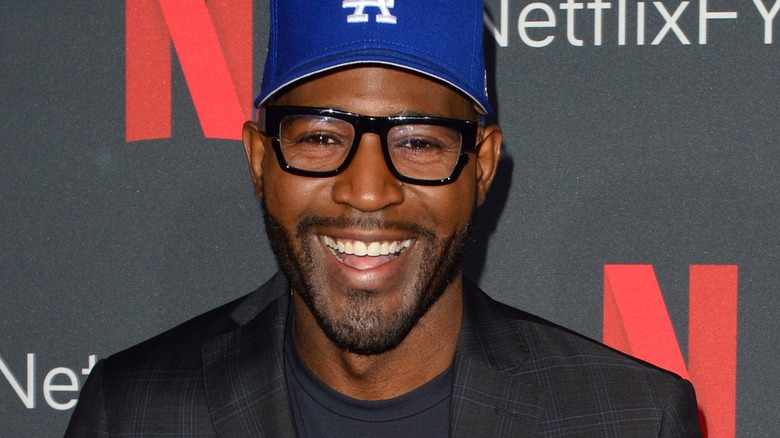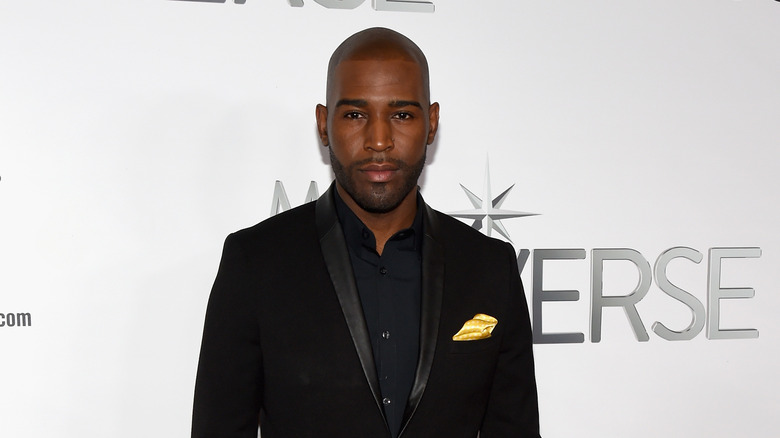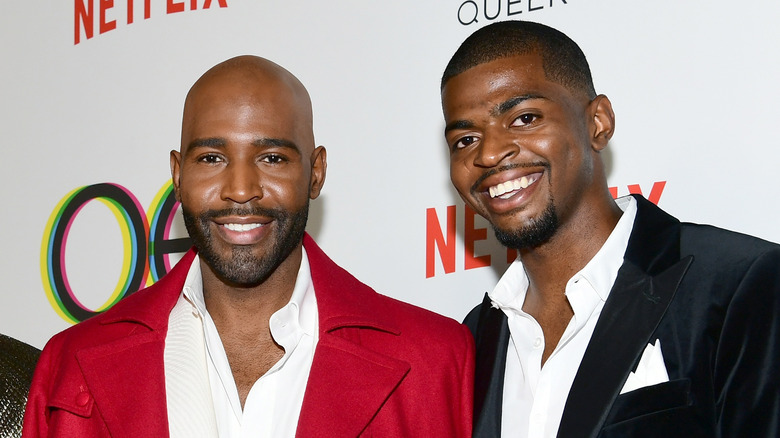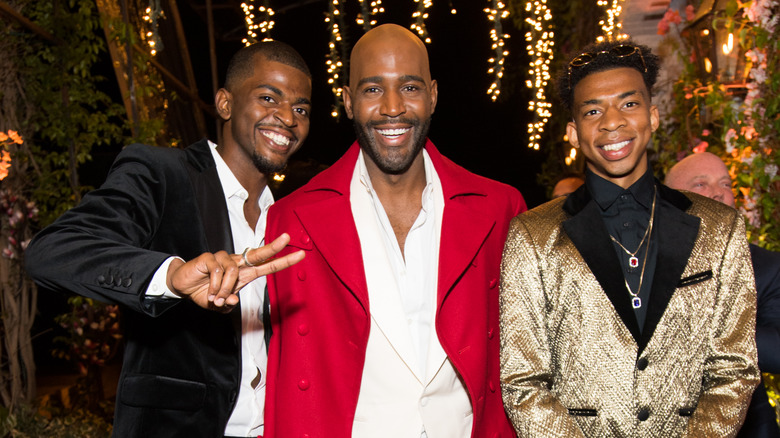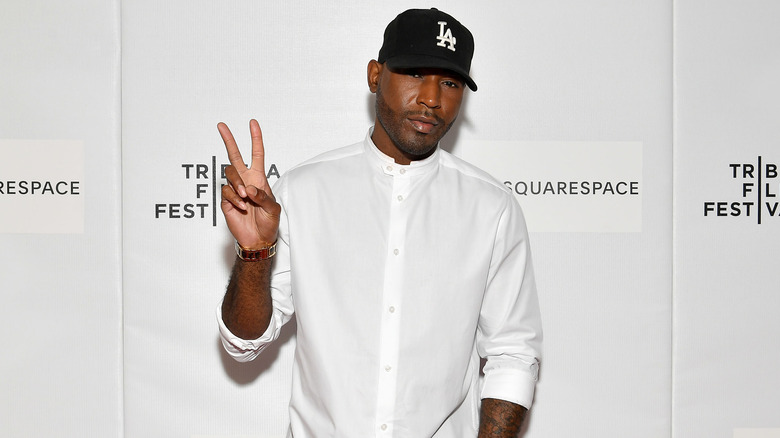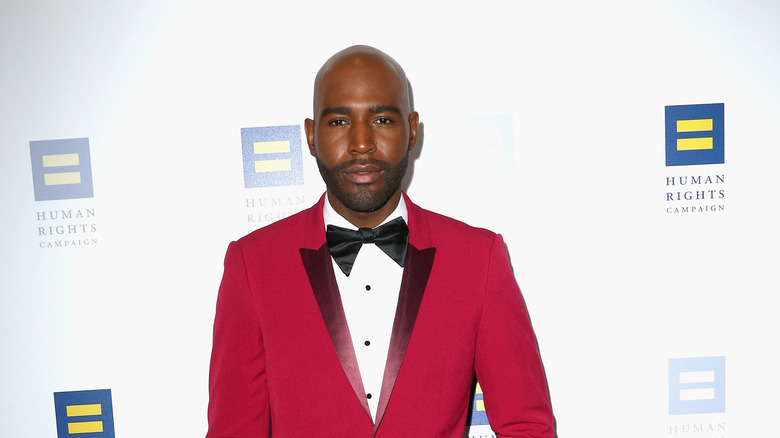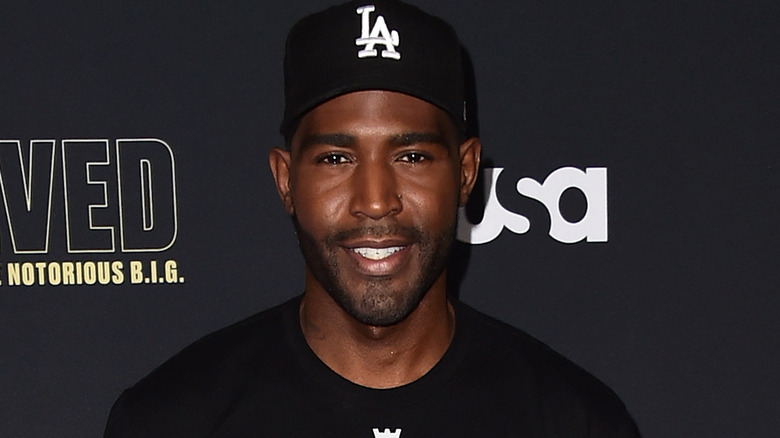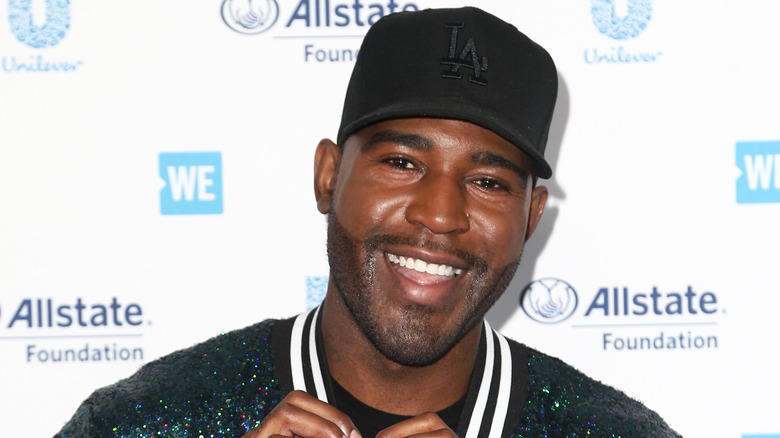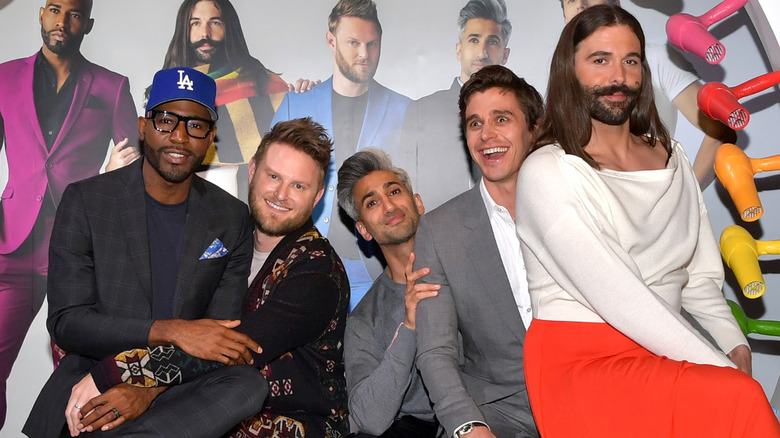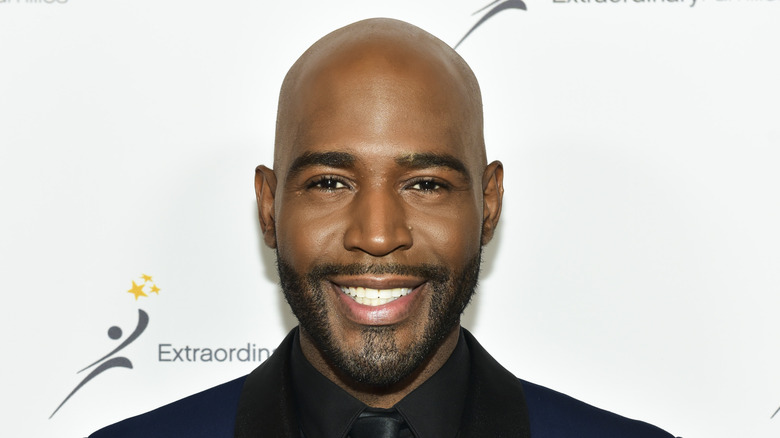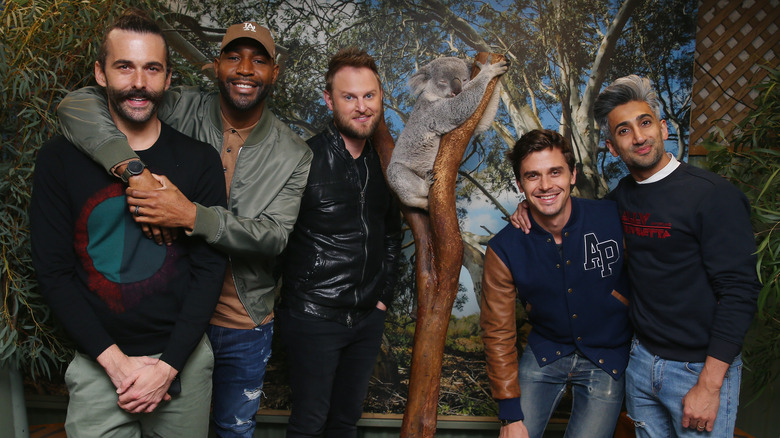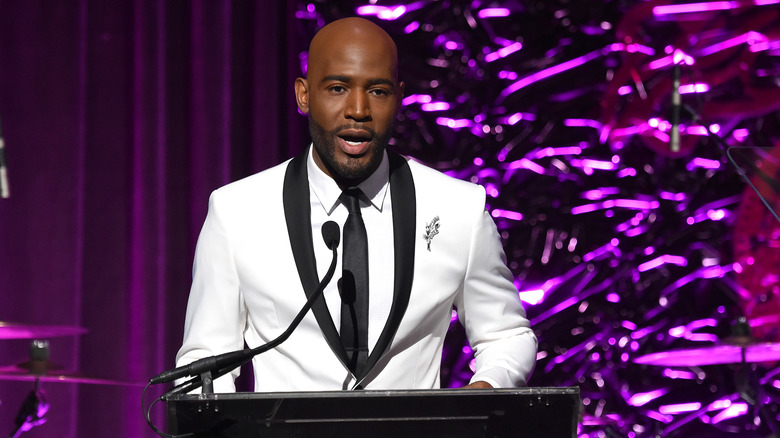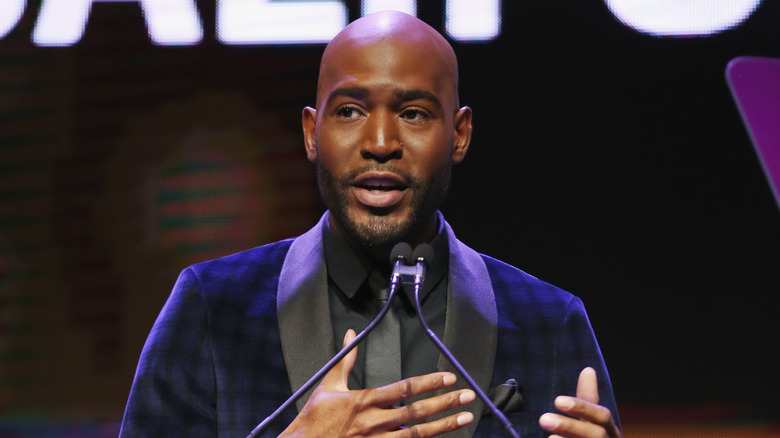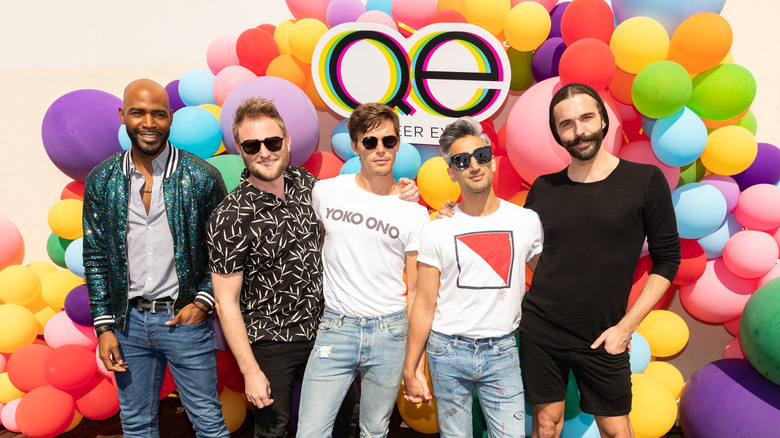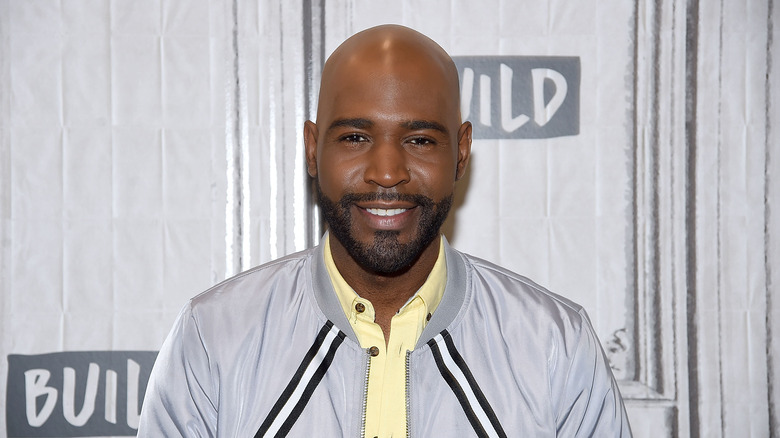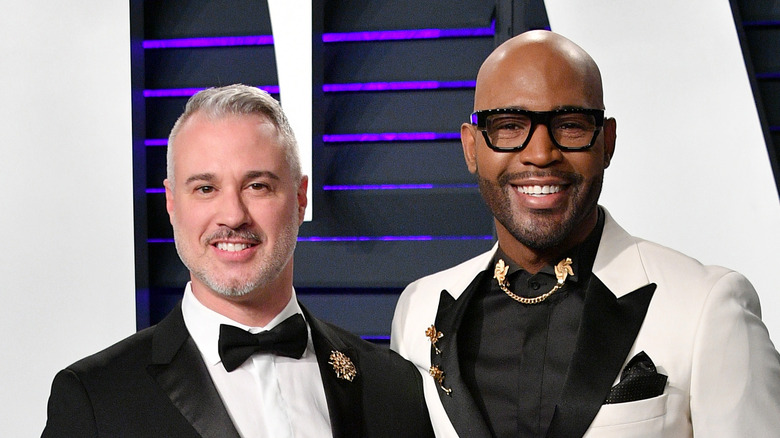The Untold Truth Of Karamo Brown
Karamo Brown is the resident culture expert on Netflix's mega-hit Queer Eye revival, always managing to find common ground no matter what the situation. His viewpoint is so valuable, in fact, that early 2019 saw him launching his very own advice-giving podcast. But surely nobody could have it so together all the time, right? Was Brown always this secure with himself, or was he ever plagued by doubts like the rest of us?
It's impossible to imagine the current iteration of Queer Eye existing without its so-called culture expert, but there's been confusion since the show's debut about what Brown's title actually means in practice. However, the mysterious moniker is effortlessly embodied by Brown himself who, with the swish of a satin bomber jacket and the glint of his perfect, impeccably white smile, breezes into the lives of contestants and viewers alike as though he's been there forever.
Still, nobody's life is perfect, never mind someone who found out he was a father when a good portion of his child's life had already passed, who struggled with drugs, and who even considered ending it all at one point. This is the untold truth of Karamo Brown.
Queer Eye wasn't Karamo Brown's first reality TV gig
The role of culture expert on Queer Eye fits Karamo Brown like one of those beautiful bomber jackets he's so fond of (he even created his own line, K Stately, just to drive the point home). But it wasn't his first sojourn into the world of reality TV. Back in 2004, Brown was a cast member on MTV's hit show The Real World: Philadelphia. As he explained to The Washington Post, although it was a big break for him, The Real World wasn't Brown's endgame. Moreover, the then-22-year-old wasn't in the best head-space to deal with the subsequent fame.
He explained, "22-year-old Karamo was called 'Crazy Karamo.' When I got that show, there was no positivity. That led to ... the addiction issues and tumultuous relationships." Brown added, "But I'm glad that I had that because I needed to know that failure so that I could grow. I say often, 'Failure is not the opposite of success. It's part of it.'"
Fifteen years after his first tussle with so-called reality TV, Brown sat down with MTV to re-watch his Real World stint. The results were predictably hilarious.
Karamo Brown didn't know he was a father
Post-Real World was a dark time for Karamo Brown, but something positive did come out of the experience: He met his son. Jason Brown was actually watching his father on television and, two years after the show aired, made himself known when papers appeared demanding late child support payments. As the elder Brown explained to Advocate, the timing wasn't great. "At first, I thought I was on the MTV show Punk'd," he admitted, referring to the Ashton Kutcher-fronted celebrity prank show.
The Texas attorney general's office confirmed the child was his. If the mother, who moved away after falling pregnant at 15, hadn't applied for state benefits, the Queer Eye star may have never discovered the truth. After flying back to Texas, where he's originally from, to meet his son, the two quickly bonded and Brown actually obtained custody of Jason that same year, in 2007. His own family, thankfully, was on board. "Every single person was over-the-moon elated. At the time, there seemed no possible way I was having a child ... And being a boy, I think everyone wanted for me to carry on the name," he recalled.
Karamo Brown got sober for his kids
As Karamo Brown explained to Advocate, although he took his son out of a difficult situation, the real blessing was his. "People say, 'You saved his life.' And I say, 'No, he saved mine.' Because once I saw that there was somebody else out there, it made me immediately start work on myself, because I wanted him to have a better relationship [with me] than I had with my father," he revealed.
As he discussed with People, when the reality star first arrived in Houston to meet Jason for the first time (he would subsequently adopt Jason's half-brother, Christian, too), he was fresh off a massive bender. "I was just so scared that my life was always going to be dark. I just was scared that I'm going to create another bad situation in my life, but this time it was going to involve an innocent child," he admitted. Brown now sees it as a major turning point, as "the day that I started to feel like I started to heal."
Karamo Brown's memoir aims to educate white people
In 2019, Karamo Brown released his memoir, Karamo: My Story of Embracing Purpose, Healing, and Hope, in which he discusses his past problems with drugs and all things Queer Eye, among other topics. Speaking at the L.A. Times' Festival of Books, the publication noted Brown told the audience, "If it's hysterical, it's historical."
Espousing his own particular brand of self-help, Brown encouraged the assembled crowd, saying, "Every single one of you is perfectly designed. ... And if you are on a journey to change something about you because you want to, understand that it's part of the perfect design as well." He continued, "You have the ability to ask for help so you could create the life you want."
Out cultural commentator Tre'vell Anderson credited Brown with providing an insight into a life experience a whole section of society wouldn't be aware of otherwise, describing the book as "a study of how to survive in America told through the story of someone Black, queer, and visible."
Karamo Brown's passionate about gun control for very personal reasons
The gun control debate rages on as the number of deadly shootings rises. Karamo Brown is as passionate about gun control as many other people, but for reasons closer to home. As an alumn of Marjory Stoneman Douglas High School in Parkland, Fla., the site of a horrific shooting, Brown felt a duty to speak out as an activist and proponent of gun control.
"I was a student at Stoneman Douglas from '95 to '99. That was home. I grew up right on the edge of Coral Springs and Parkland — I could have walked to school. The March [for Our Lives] was so moving and inspiring, but also reaffirming," he told Marie Claire, noting, "I keep reminding people that our school was named after an activist, so it's no surprise that a lot of people coming out of there have learned how to use their voice to fight for what's right. These kids, in the midst of this tragedy, are like no, I'm going to fight."
Brown also gave a moving speech for the Human Rights Campaign ahead of the March about a friend he'd lost in the shooting.
Karamo Brown doesn't think this offensive word should be used under any circumstances
Karamo Brown isn't one to mince words, whether he's campaigning for tighter gun laws or educating a white police officer about the Black Lives Matter movement. In his memoir, Brown noted he will never get used to being referred to as the N-word, even by other black people. Recalling an incident, he wrote in his memoir (via Out), "I immediately recoiled, hurt and disgusted. ... I also sensed that if I didn't respond I wasn't 'black' enough... It was a dagger into me every single time I heard that word." Referencing a shirt he wore to the premiere of Unsolved: The Murders Of Tupac And The Notorious B.I.G., he advised, "We are being conditioned by our own culture that it's okay to call one another this derogatory term, as long as nobody else calls us that."
Brown doubled-down on his comments on the Keep It podcast, explaining that he "[understands] the pain that word" causes. Although he used to use it when he was young, Brown got uncomfortable when people outside his race started to, too. He surmised, "You teach people how to treat you."
Karamo Brown contemplated taking his own life
At the height of his Real World fame, Karamo Brown battled some demons. Although he came out the other side, moving to Texas to be a father, as the Queer Eye star discussed in his memoir, it wasn't all smooth sailing. At a pre-Emmys party, someone took out cocaine, leading Brown to have a serious problem. "I was thinking ... maybe! This is a party environment, people won't know. It's been years!" he admitted to the New York Post.
Brown didn't succumb but explained to the Post that, regardless, "When you're thrust into a world ... of press, of fame, of not being around your family, it can be difficult." He developed a drug habit while doing promotional work off the back of his Real World stint, but it made things less manageable in the long run. It even led to him attempting suicide at his lowest point, with the reality star revealing, "I just felt alone and lost." He added, "I think I would have kept going until it was 'Karamo, dead at 26, former Real World star.' "
Karamo Brown knows his Queer Eye title is misleading
Out of everybody in the all-new Fab Five, Karamo Brown has taken the most flak for his role as the so-called "culture expert." Speaking to House Beautiful, Brown acknowledged it was a confusing title, especially in the beginning. "People didn't really understand what it was. When they had 'Grooming' and 'Fashion' experts, they understood what that meant," he said.
If you're still confused about what precisely his role is, Brown is happy to elaborate, explaining his job is "to fix the inside — fix the heart and mind." He went on, "It's great when you have a transformation on the outside, but if you don't fix what's on the inside, then the transformation on the outside will never last." Furthermore, he believes Queer Eye is in a unique position to target transformation from the outside in. "It shows that you can fix the outside, but it's also about focusing on what got you to that place. As we've gone through the seasons, people have started to identify with that more, versus being confused by the title," he said.
Is Karamo Brown a budding interior designer?
Adding another feather to his "culture expert" cap, Karamo Brown applied his considerable talents for making people feel more at home (along with his impeccable taste) to give back yet again. The Florida A&M University alum partnered with HomeGoods to help re-imagine a student lounge at his alma mater, telling Architectural Digest he hoped to create a space where students felt "comfortable being [their] whole self."
As Brown explained, "Whether you're in the space to cram for a final or just trying to unwind, my goal was to inspire every student to be their best self." Plus, the Queer Eye star half-joked, "It makes for a great Instagram backdrop!" One of the most eye-catching elements of Brown's redesign was the addition of a so-called inspiration wall, which showcases images and phrases including artwork, motivational sayings, and the requisite odes to Florida and FAMU.
Brown encourages everybody to put their own personal stamp on their living or working environment as, "How you set up your space directly affects your mental health and well-being."
Karamo Brown's background gave him a unique viewpoint for Queer Eye
Nobody else could fill Karamo Brown's shoes on Queer Eye. His unique viewpoint disarms participants at every turn, particularly during difficult conversations. As Brown explained to Vanity Fair, it all came about because of, well, him. "In the original casting for my category, I would say 95% of the men owned art galleries or were artists or painters of some sort. Because they wanted the culture role to be what it originally was — a Broadway star. When we got down to the end, it was myself against someone who was the owner of an art gallery and also had a Broadway show coming out," he explained.
Nobody does culture like Karamo, and, as he revealed, that's what eventually sealed the deal. "I was very clear: I have a background as a social worker. Being able to get to the emotional core is the only way to sustain change. ... I can introduce you to an art gallery all day long, but that's not going to help you to figure out why you haven't cleaned your house, changed your hair, changed your diet... any of those things, in 20 years," he said.
Karamo Brown may look fit and healthy but... he isn't
Karamo Brown may look the picture of perfect health, with his consistently clear skin and relentlessly sunny outlook, but, underneath it all, he's a couch potato just like the rest of us. By his own admission, Brown is incredibly unfit and unhealthy, subsisting on junk food and refusing to work out, basically ever. Speaking to The Guardian, he shockingly admitted, "All I eat is candy, Coca-Cola and cookies."
In direct contrast to how well he appears on TV or while hitting the red carpet, the Queer Eye star revealed he isn't a gym rat either — by any stretch of the imagination. "I do not work out. Never happening. I will not go on a treadmill. Running in the same spot makes me think of a hamster," he shrugged. Does that mean he won't be following in co-star Antoni Porowski's footsteps and posing for a Tom Ford underwear campaign any time soon? Disappointing.
Karamo Brown didn't come out, he let people in
The reality star is very exact when it comes to language. As a result, Karamo Brown prefers the term "letting people in" to "coming out." He wrote in his book, as shared by GQ, "We don't need to let everyone into every part of our lives. It doesn't mean that we're ashamed of who we are," noting, "The power of me loving and accepting myself is not determined by someone else's opinion of me."
As he explained to GQ, there are several different sides to his personality and not all of them are necessarily up for public consumption. "When I'm with family, when I'm at work, I'm very proud of all parts of my life, but there are people on Queer Eye I don't speak with about my relationship as a father. I don't tell them what I say with my kids. Does that mean they don't know I'm a father? They might or might not, but they're not part of my life. There are things we don't have to talk about," he reasoned.
Karamo Brown was worried about being on a show called Queer Eye
The title for the original iteration of makeover show Queer Eye for the Straight Guy was shortened to Queer Eye in keeping with the expectations of a modern audience. Even so, Karamo Brown was concerned about appearing on a show with "queer" in the title. As he explained to The Guardian, "I was worried about the term 'Queer Eye' because queer, for a lot of people, is a derogatory term. I had my own feelings about it: I identify as gay, not as queer."
However, after speaking with fellow LGBTQ people, Brown realized it was a positive moniker. "The queer community said: 'I'm gonna take this term back and use this power.' The minute I looked at it from that perspective, I was proud to be on a show with that title," he shared. Brown, for his part, is very open about who he is. "People don't usually assume I am gay. I tend to announce it. I am a proud, gay man," he explained.
Karamo Brown loves making people cry
Unsurprisingly, for a show that marketed its second season with a tongue-in-cheek reference to the emotional reaction to its first, Queer Eye is proud of its ability to elicit tears. And nobody is prouder of that fact than Karamo Brown who, to be fair, is usually the one bringing participants to the emotional edge. As he revealed to Nylon, this caused friction with the show's creator. "After the second episode, [he] literally came in the trailer and said, 'Karamo, enough with trying to make people cry.' And I was like, 'No, I will not.' ... Every day I was like, 'My job is to figure out how I can make this guy cry.' And not in a sadistic way, but to get him to reach a breakthrough."
The culture expert always envisioned himself as the emotional rock of the show. He even told The Guardian, "Making people cry is my favorite thing to do. That was my one goal during Queer Eye. I understand the importance of having a cathartic moment."
Karamo Brown's Bridezilla tendencies put his fiance in hospital
In May 2018, Karamo Brown popped the question to his partner of eight years, director Ian Jordan, at his birthday party, as reported by People at the time. Although the Queer Eye culture expert got an enthusiastic "Yes!" poor Jordan was hospitalized just a few months later,. As reported by Page Six, Brown revealed at an event that his fiancé was taken to the hospital on Thanksgiving. "He had a severe anxiety attack, he thought it was a heart attack. They were like, 'Everything is fine with you, it's anxiety. What were you talking about before?' and [Jordan] was like, 'He's been talking about the wedding!'" Brown recalled.
Considering the reality star "just paid for a Ferris wheel" for the Friday night of their three-day wedding celebration, it makes sense Jordan was feeling the strain. Brown told Us Weekly he was modeling their big day on Nick Jonas and Priyanka Chopra's extravagant wedding event. "I mean, I'm doing well financially, not as well as them, but I'm trying to figure out how can I recreate what they had because I loved it," he reasoned.
